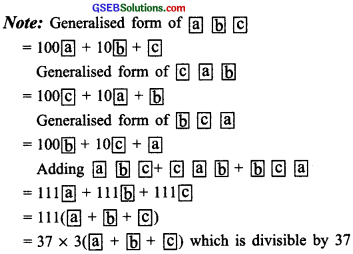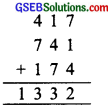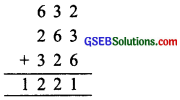Gujarat Board GSEB Textbook Solutions Class 8 Maths Chapter 16 Playing with Numbers Intex Questions and Answers.
Gujarat Board Textbook Solutions Class 8 Maths Chapter 16 Playing with Numbers Intex Questions
Try These (Page 250)
Question 1.
Write the following numbers in generalised form?
- 25
- 73
- 129
- 302
Solution:
1. 25 = 20 + 5 = 10 × 2 + 5 × 1
= 10 × 2 + 5
2. 73 = 70 + 3
= 10 × 7 + 3 × 1
= 10 × 7 + 3
3. 129 = 100 + 20 + 9
= 100 × 1 + 10 × 2 + 1 × 9
= 100 × 1 + 10 × 2 + 9
4. 302 = 100 × 3 + 10 × 0 + 1 × 2 = 300 + 0 + 2
![]()
Question 2.
Write the following in the usual form?
- 10 × 5 + 6
- 100 × 7 + 10 × 1 + 8
- 100 × a + 10 × c + b
Solution:
- 10 × 5 + 6 = 50 + 6 = 56
- 100 × 7 + 10 × 1 + 8 = 700 + 10 + 8 = 718
- 100 × a + 10 × c + b = 100a + 10c + b
=
Try These (Page 251)
[Adding the number with reversed digits to the chosen numbers.]
Question 1.
Check what the result would have been if Sundaram had chosen the numbers shown below?
- 27
- 39
- 64
- 17
Solution:
1. Chosen number = 27
Number with reversed digits = 72
Sum of the two numbers = 27 + 72 = 99
Now, 99 = 11 [9] = 11 [2 + 7]
= 11 [Sum of the digits of the chosen number]
2. Chosen number = 39
Number with reversed digits = 93
Sum of the two numbers = 39 + 93 = 132
Now, 132 + 11 = 12
i. e., 132 = 11[12] = 11 [3 + 9]
= 11 [Sum of the digits of the chosen number]
3. Chosen number = 64
Number with reversed digits = 46
Sum = 64 + 46 = 110
Now, 110 = 11[10] = 11 [6 + 4]
= 11 [Sum of the digits of the chosen number]
4. Chosen number = 17
Number with reversed digits = 71
Sum = 17 + 71 = 88
Now, 88 = 11[8] = 11[1 + 7]
= 11 [Sum of the digits of the chosen number]
Try These (Page 251)
[Finding the difference of the chosen number and the number obtained by reversing the digits.]
Question 1.
Check what result would have been if Sundaram had chosen the numbers shown?
- 17
- 21
- 96
- 37
Solution:
1. Chosen number =17
Number with reversed digits = 71
Difference = 71 – 17 = 54 = 9 × [6]
= 9 × [Difference of the digits of the chosen number (7 – 1 = 6)]
2. Chosen number = 21
Number with reversed digits = 12
Difference = 21 – 12 = 9 = 9 × [1]
= 9 × [Difference between the digits of the chosen number (2 – 1 = 1)]
3. Chosen number = 96
Number with reversed digits = 69
Difference = 96 – 69 = 27 = 9 × [3]
= 9 × [Difference between the digits of the chosen number (9 – 6 = 3)]
4. Chosen number = 37
Number with reversed digits = 73
Difference = 73 – 37 = 36 = 9 × [4]
= 9 × [Difference between the digits of the chosen number (7 – 3 = 4)]
![]()
Try These (Page 252)
Question 1.
Check what the result would have been if Minakshi had chosen the numbers shown below. In each case keep a record of the quotient obtained at the end?
- 132
- 469
- 737
- 901
Solution:
1. 132 Chosen number = 132
Reversed number = 231
Difference = 231 – 132 = 99
We have 99 ÷ 99 = 1, remainder = 0
2. 469 Chosen number = 469
Reversed number = 964
Difference = 964 – 469 = 495
We have 495 ÷ 99 = 5, remainder = 0
3. Chosen number = 737
Reversed number = 737
We have Difference = 737 – 737 = 0
0 ÷ 99 = 0, remainder = 0
4. Chosen number = 901
Reversed number = 109
Difference = 901 – 109 = 792
We have 792 ÷ 99 = 8, remainder = 0
Forming three-digit number with given three digits

![]()
Try These (Page 253)
Question 1.
Check what the result would have been if Sundaram had chosen the numbers shown below?
- 417
- 632
- 117
- 937
Solution:
1. Chosen number = 417
Two other numbers with the same digits are 741 and 174
Sum of the three numbers

We have 1332 ÷ 37 = 36, remainder
2. Chosen number = 632
Two other numbers are 263 and 326
Sum of the three numbers

We have 1221 ÷ 37 = 33, remainder = 0
3. Chosen number =117
Other numbers are 711 and 171
Sum of the three numbers

We have 999 ÷ 37 = 27, remainder = 0
4. Chosen number = 937
Other two numbers are 793 and 379
∴ Sum of the three numbers

We have 2109 ÷ 37 = 57, remainder = 0
Try These (Page 257)
Question 1.
If the division N ÷ 5 leaves a remainder of 1, what might be the ones digit of N?
Solution:
The ones digit, when divided by 5, must leave a remainder of 3. So the ones digit must be either 3 or 8.
Question 2.
If the division N ÷ 5 leaves a remainder of 1, what might be the ones digit of N?
Solution:
If remainder = 1, then the ones digit of ‘N’ must be either 1 or 6.
Question 3.
If the division N ÷ 5 leaves a remainder of 4, what might be the ones digit of N?
Solution:
If remainder = 4, then the ones digit of ‘N’ must be either 9 or 4.
Try These (Page 257)
Question 1.
If the division N ÷ 2 leaves a remainder of 1, what might be the ones digit of N?
Solution:
N is odd; so its ones digit is odd. Therefore. the ones digit must be 1, 3, 5, 7 or 9.
Question 2.
If the division N ÷ 2 leaves no remainder (i.e.. zero remainder), what might be the one digit of N?
Solution:
∵ Remainder = 0
∴ Ones digit can be 0, 2, 4, 6 or 8.
![]()
Question 3.
Suppose that the division N ÷ 5 leaves a remainder of 4 and the division N ÷ 2 leaves a remainder of I. What must be the ones digit of N?
Solution:
∵ N + 5 and remainder = 4
∴ Ones digit can be 4 or 9.
Again N ÷ 2 and remainder = 1
∴ N must be an odd number.
Thus, ones digit can be 9 only.
Try These (Page 259)
Question 1.
Check the divisibility of the following numbers by 9?
1. 108
2. 616
3. 294
4. 432
5. 927
Solution:
1. 108
∵ 1 + 0 + 8 = 9
and 9 is divisible by 9.
[∵ 9 + 9 = 1 and remainder = 0]
∴ 108 is divisible by 9.
2. 616
We have 6 + 1 + 6 = 13
and 13 ÷ 9 = 1, remainder = 4
i.e., 13 is not divisible 9.
∴ 616 is also not divisible by 9.
3. 294
We have 2 + 9 + 4 = 15
and 15 + 9 = 1, remainder = 6
i.e., 15 is not divisible by 9.
∴ 294 is also not divisible by 9.
4. 432
We have 4 + 3 + 2 = 9
9 + 9 = 1, remainder = 0
∴ 432 is divisible by 9.
5. 927
We have 9 + 2 + 7 = 18
and 18 + 9 = 2, remainder = 0
i.e., 18 is divisible by 9.
∴ 927 is also divisible by 9.
![]()
Try These (Page 260)
Question 1.
Check the divisibility of the following numbers by 3?
1. 108
2. 616
3. 294
4. 432
5. 927
Solution:
1. 108
We have 1 + 0 + 8 = 9
and 9 + 3 = 3, remainder = 0
∴ 108 is divisible by 3.
[∵ 9 is divisible by 3]
2. 616
We have 6 + 1 + 6 = 13
and 13 ÷ 3 = 4, remainder = 1
∴ 13 is not divisible by 3.
Thus 616 is also not divisible by 3.
3. 294
We have 2 + 9 + 4 = 15
and 15 ÷ 3 = 5, remainder = 0
∴ 15 is divisible by 3.
Thus, 294 is also divisible by 3.
4. 432
We have 4 + 3 + 2 = 9
and 9 ÷ 3 = 3, remainder = 0
i.e; 9 is divisible by 3.
Thus, 294 is also divisible by 3.
5. 927
we have 9 + 2 + 7 = 18
and 18 ÷ 3 = 6, remainder = 0
i.e; 18 is divisible by 3.
Thus, 927 is also divisible by 3.